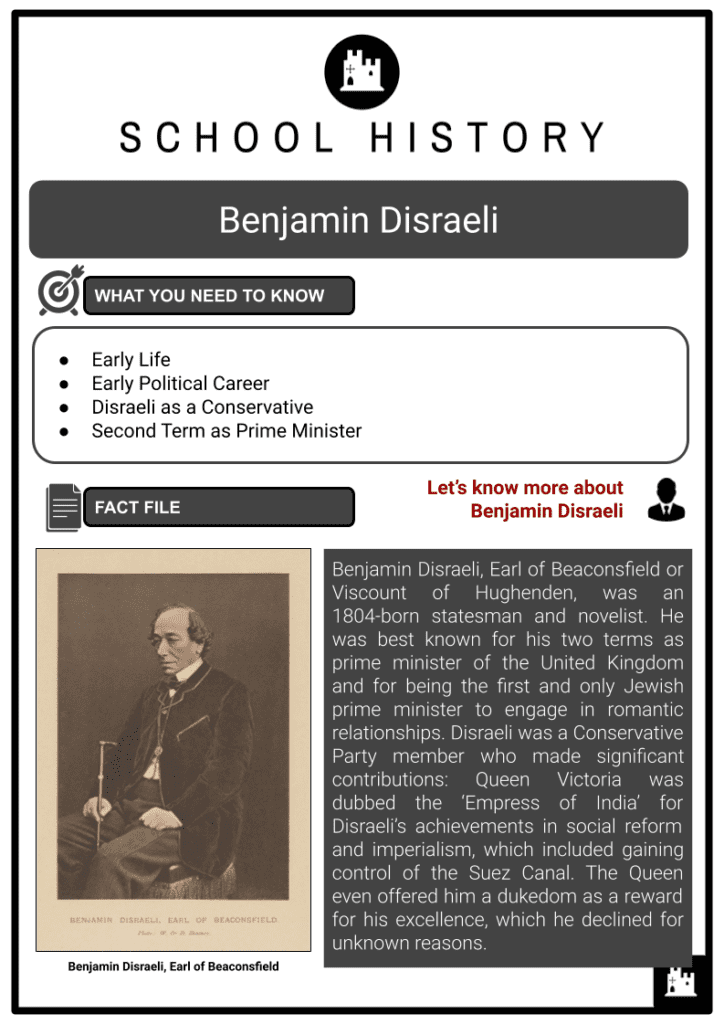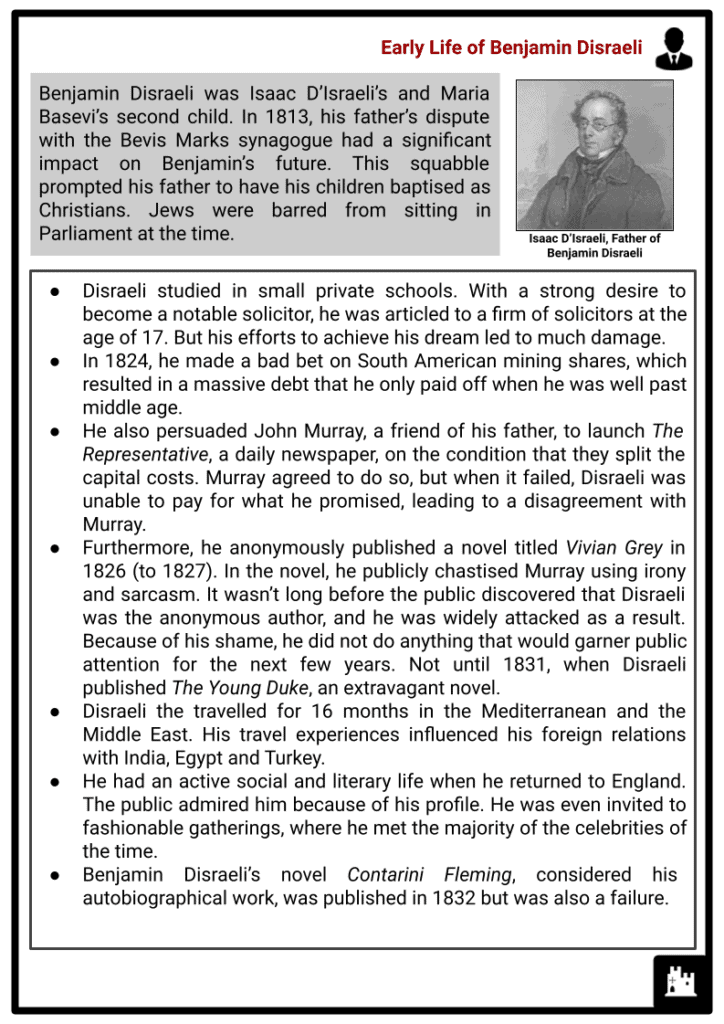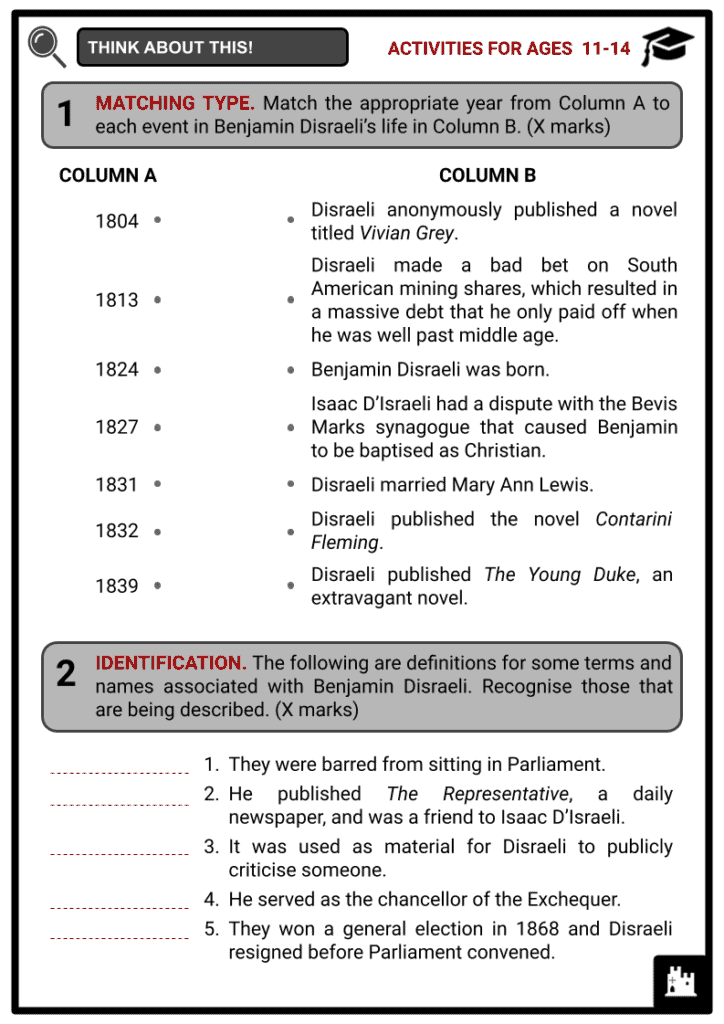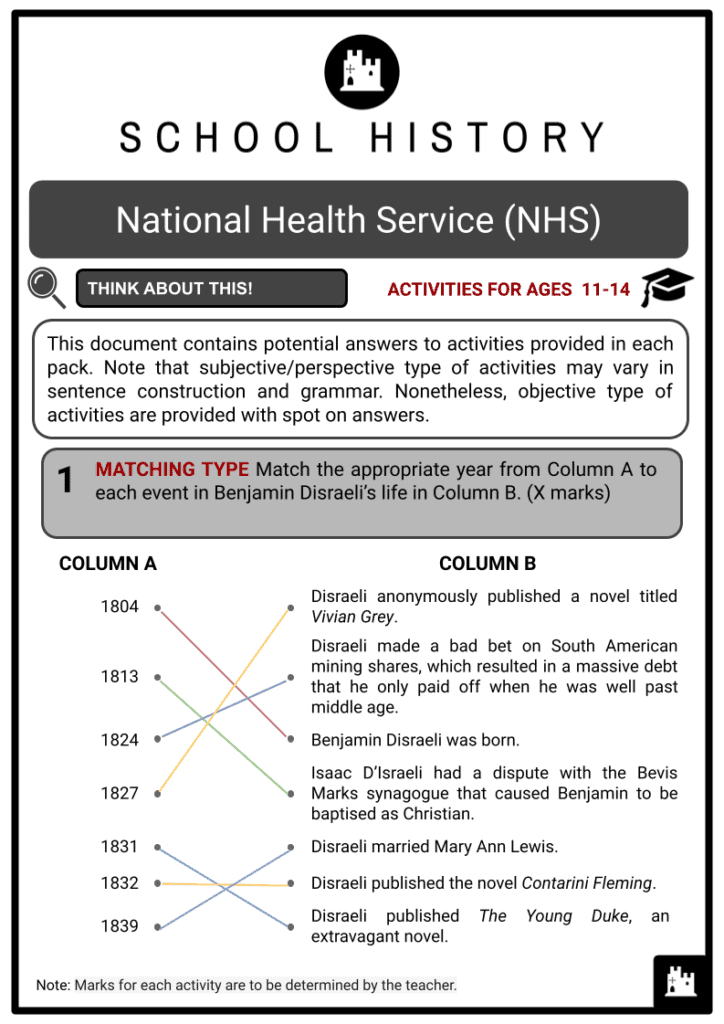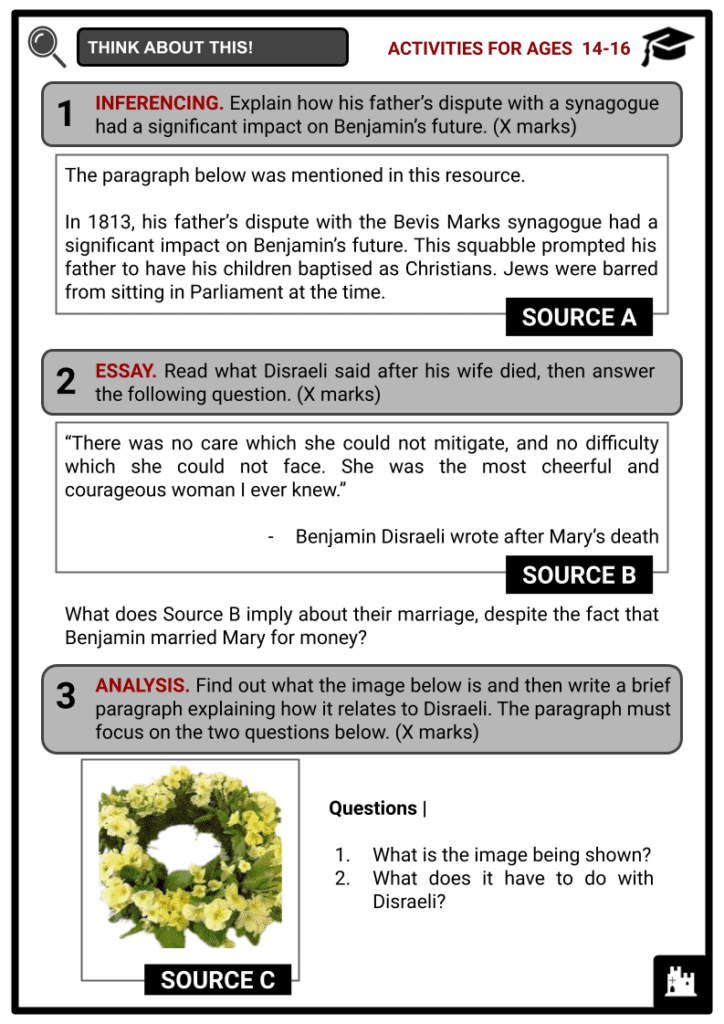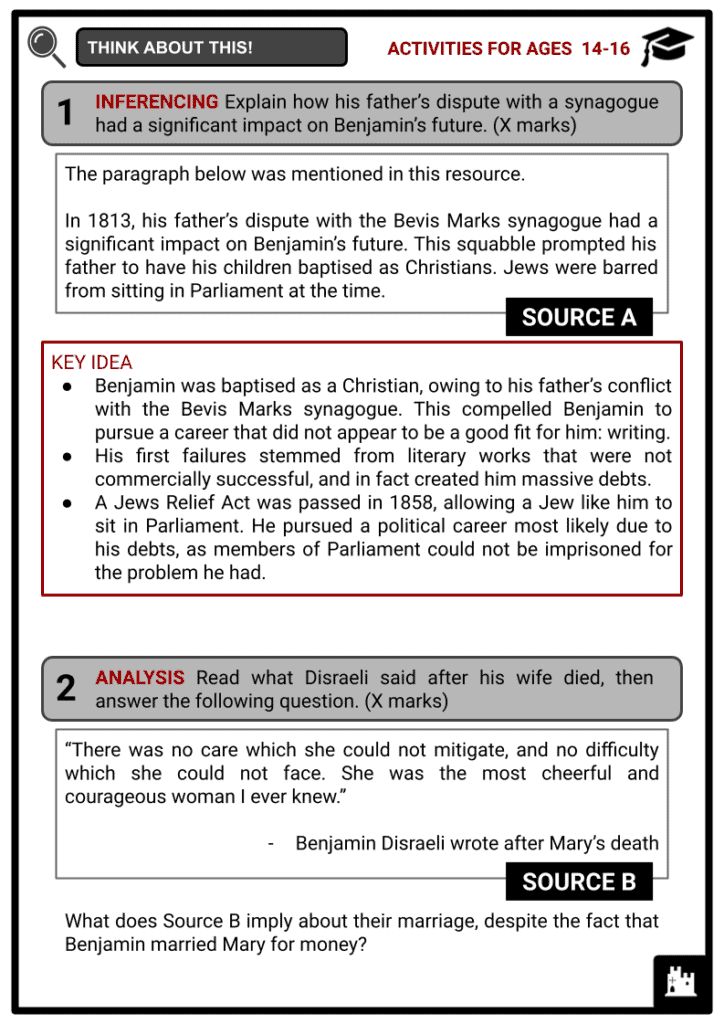Download Benjamin Disraeli
Do you want to save dozens of hours in time? Get your evenings and weekends back? Be able to teach Benjamin Disraeli to your students?
Our worksheet bundle includes a fact file and printable worksheets and student activities. Perfect for both the classroom and homeschooling!
Summary
- Early Life
- Early Political Career
- Disraeli as a Conservative
- Second Term as Prime Minister
Key Facts And Information
Let’s find out more about Benjamin Disraeli!
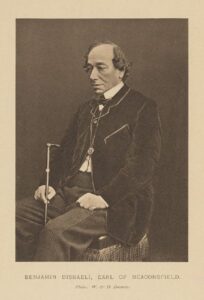 Benjamin Disraeli, Earl of Beaconsfield or Viscount of Hughenden, was an 1804-born statesman and novelist. He was best known for his two terms as prime minister of the United Kingdom and for being the first and only Jewish prime minister to engage in romantic relationships. Disraeli was a Conservative Party member who made significant contributions: Queen Victoria was dubbed the ‘Empress of India’ for Disraeli’s achievements in social reform and imperialism, which included gaining control of the Suez Canal. The Queen even offered him a dukedom as a reward for his excellence, which he declined for unknown reasons.
Benjamin Disraeli, Earl of Beaconsfield or Viscount of Hughenden, was an 1804-born statesman and novelist. He was best known for his two terms as prime minister of the United Kingdom and for being the first and only Jewish prime minister to engage in romantic relationships. Disraeli was a Conservative Party member who made significant contributions: Queen Victoria was dubbed the ‘Empress of India’ for Disraeli’s achievements in social reform and imperialism, which included gaining control of the Suez Canal. The Queen even offered him a dukedom as a reward for his excellence, which he declined for unknown reasons.
Early Life of Benjamin Disraeli
- Benjamin Disraeli was Isaac D’Israeli’s and Maria Basevi’s second child. In 1813, his father’s dispute with the Bevis Marks synagogue had a significant impact on Benjamin’s future. This squabble prompted his father to have his children baptised as Christians. Jews were barred from sitting in Parliament at the time.
- Disraeli studied in small private schools. With a strong desire to become a notable solicitor, he was articled to a firm of solicitors at the age of 17. But his efforts to achieve his dream led to much damage.
- In 1824, he made a bad bet on South American mining shares, which resulted in a massive debt that he only paid off when he was well past middle age.
- He also persuaded John Murray, a friend of his father, to launch The Representative, a daily newspaper, on the condition that they split the capital costs. Murray agreed to do so, but when it failed, Disraeli was unable to pay for what he promised, leading to a disagreement with Murray.
- Furthermore, he anonymously published a novel titled Vivian Grey in 1826 (to 1827). In the novel, he publicly chastised Murray using irony and sarcasm. It wasn’t long before the public discovered that Disraeli was the anonymous author, and he was widely attacked as a result. Because of his shame, he did not do anything that would garner public attention for the next few years. Not until 1831, when Disraeli published The Young Duke, an extravagant novel.
- Disraeli the travelled for 16 months in the Mediterranean and the Middle East. His travel experiences influenced his foreign relations with India, Egypt and Turkey.
- He had an active social and literary life when he returned to England. The public admired him because of his profile. He was even invited to fashionable gatherings, where he met the majority of the celebrities of the time.
- Benjamin Disraeli’s novel Contarini Fleming, considered his autobiographical work, was published in 1832 but was also a failure.
Early Political Career
- Disraeli’s political aspirations began in 1831 when he looked for a seat in Buckinghamshire, close to Wycombe, where his family lived.
- One of his first attempts at entering politics led him to lose three times in High Wycombe. This made him realise that he needed to be a member of a political party.
- In 1835, he stood for Taunton as the official Conservative candidate but was unsuccessful.
- The public doubted his reputation based on his behaviour, huge debts and an affair with the wife of Sir Francis Sykes.
- In 1837, he was elected as the official Conservative candidate for Maidstone in Kent, but his speech in the House of Commons was a flop.
- His failures did not make him stop. Instead, he said, “I will sit down now, but the time will come when you will hear me”.
- In 1839, he married Mary Ann Lewis, a widow with a house in London and £4,000 a year, intending to establish his social position. His wife was aware of this but she would just say, “Dizzy (Benjamin Disraeli) married me for my money but if he had the chance again he would marry me for love,” which Disraeli agreed to.
- In 1845, the Irish famine combined with the rebuttals of Richard Cobden persuaded Peel to invalidate the Corn Laws, which imposed defensive duties on foreign-made grain. Disraeli saw this as his opportunity to criticise Peel, which he did in a series of clever lectures. He rose to prominence when Peel resigned in 1846 after protectionists backed Disraeli by putting Peel in the minority on another issue.
Disraeli as a Conservative
- The trust most Conservative former ministers had in Peel, combined with the death of Bentinck, established Disraeli as the undisputed leader of the opposition in the Commons. Disraeli spent the next few years attempting to free his party from what he saw as the ‘hopeless cause’ of security. While Disraeli’s policy was sound, it engendered suspicion among his supporters, as did his pride in and insistence on his Jewish ancestry. The party, on the other hand, couldn’t do without his abilities.
- In 1847, Disraeli became a member for Buckinghamshire. The next year, he purchased Hughenden Manor near High Wycombe. This solidified his social and political power but his financial situation remained precarious.
- Sir Robert Peel, the Conservative leader, gave Disraeli hope of getting a position. But when their party won the election in 1841 and Peel became the prime minister, Disraeli was not given an office in the cabinet. Disraeli felt humiliated and it affected his attitude towards Peel and Conservatism. issues
- In 1852, the Whig government was deposed. The Conservative Party leader at the time, the Earl of Derby, formed a short-lived minority government. Disraeli was allowed to serve as chancellor of the Exchequer. His lack of financial knowledge, however, was not the cause of the falling budget in 1852; rather, the situation in government was bad before he started handling the finances.
- In 1858, the Tories formed an opposition party. In response, Derby formed a minority government with Disraeli as chancellor of the Exchequer. While handling the finances, Disraeli realised that parliamentary reform should not be a Whig monopoly. As a result, in 1859 he introduced a moderate reform bill. The Tories were kicked out of office once more because it was too obvious that Disraeli had designed the bill to benefit his party.
- Although Queen Victoria and Derby initiated a new Conservative reform bill, Disraeli introduced it in the Commons and led the fight for it with unrivalled enthusiasm and mastery of parliamentary tactics. He believed the bill should be broad and include certain safeguards, and he was adamant that it be passed by a Conservative government.
- Because the Liberals had the majority, Disraeli was forced to accept their amendments that removed nearly all of the safeguards.
- Derby retired from politics in 1868, and Disraeli became prime minister. According to him, becoming prime minister is like “climbing to the top of a greasy pole”. The Liberals won a general election later that year and Disraeli resigned before Parliament convened.
- The next 12-year period in politics saw changes from the usual events of shifting groups that had occurred since Disraeli’s political career began. Instead, politics were defined by two parties with consistent policies.
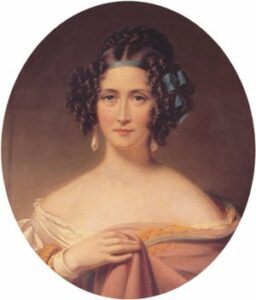
- Disraeli initially attempted to create a new image for the Conservative Party in the hope that it would convince the new electorate. Disraeli took charge of the party with a firm hand beginning in 1872. He defended the monarchy and the church against what he saw as a threat posed by the radical Liberal policy. He also emphasised social reform while announcing a tough stance against Russia.
- In 1872, Disraeli’s wife died of cancer. This resulted in material losses, such as his wife’s house and her fortune, which were passed down to her cousins. Disraeli fought a political battle even though he was in poor health at the age of 68.
- Gladstone’s ministry was defeated in 1873, but he was quickly persuaded to return to office when Disraeli refused to accept it. Despite the fact that a year had passed, Gladstone dissolved Parliament himself, but Disraeli claimed it had a lot of unfinished business and should not be dissolved.
- In 1874, Disraeli worked on organising the Conservative Party as well as the electoral machinery that resulted in the Conservatives’ victory.
Second Term as Prime Minister
- Disraeli was already old when he gained the power he desired, but this did not prevent him from achieving his political goals. He had a good relationship with the Queen, who, like Disraeli, despised Gladstone, and he gained something from it.
- Disraeli was able to demonstrate the importance of Tory democracy during his second term as prime minister. An act enacted to improve the living conditions of artisans and labourers created the possibility of effective slum clearance. The Public Health Act of 1875 organised the complicated health law. A number of factory acts were also passed in 1874 and 1878 to prevent labour exploitation.
- Disraeli’s foreign policies brought him even more success. The luxurious and profligate khedive Ismāʾīl Pasha of Egypt possessed just under half the Suez Canal Company’s shares and was nervous to sell. This fact was found out by an English journalist and reported to the Foreign Office. Disraeli looked into it and purchased the shares with funds from the Rothschild family. He was able to acquire the Suez Canal shares as a result of this. The agreement was regarded as a significant success for the imperial reputation.
- The conflict between Russia and Turkey, which erupted during the Crimean War in the 1850s, died out. In 1877, the Ottoman Empire’s Christian subjects rose up against intolerable misrule, and Russia declared war on Turkey once more. It arrived at the gates of Constantinople in 1878, and Britain was concerned about the route to India. Disraeli, with sound judgement, suggested that displaying force would suffice to keep Russia from causing them harm.
- Because of his achievements, the Queen bestowed upon him a dukedom and the Order of the Garter, which he declined and accepted, respectively.
- In the 1880 general election, the Conservatives were heavily defeated due to his reputation.
- Meanwhile, his health deteriorated rapidly. Days after his funeral, Queen Victoria came to put a wreath on his burial site as a sign of their friendship.

